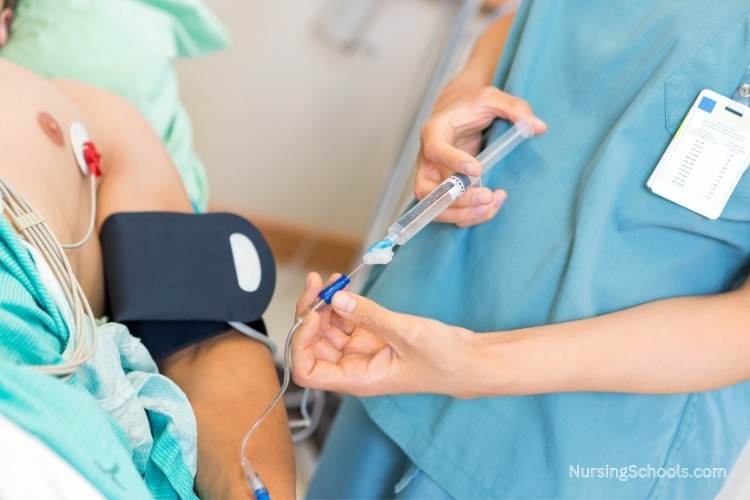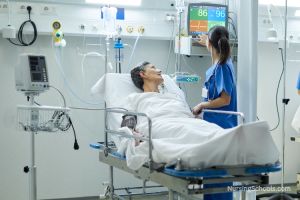Telemetry Nurse
Nursing Career Guide

Continuous monitoring can make all the difference for patients with serious cardiac or respiratory conditions, and Telemetry Nurses are trained to interpret the data that drives critical care decisions. These nurses specialize in observing heart rhythms, tracking vital signs, and responding to changes in patient status using advanced telemetry equipment. They work in step-down units, progressive care units, and telemetry floors within hospitals, often serving patients who require close observation without being in the ICU. Let's delve into the Telemetry Nurse role and explore what it takes to thrive in this fast-paced and monitoring-focused nursing specialty.
Overview
What Is a Telemetry Nurse?
A Telemetry Nurse is a Registered Nurse (RN) who specializes in monitoring and caring for patients with acute cardiac and respiratory conditions using telemetry equipment. These nurses work with advanced technology to track patients' vital signs in real-time, particularly heart rhythms, and intervene when abnormalities arise.
Telemetry Nurses work in hospitals, step-down units, progressive care units (PCUs), and specialized cardiac monitoring floors. They care for patients recovering from heart attacks, strokes, and surgeries and those with chronic conditions such as heart failure or arrhythmias.
This career demands strong clinical judgment, a deep understanding of cardiac care, and the ability to act quickly in emergency situations.
Education
How To Become a Telemetry Nurse
Becoming a Telemetry Nurse requires a combination of traditional nursing education, clinical experience, certification, and specialized training in cardiac monitoring and telemetry systems. Follow these steps to enter this challenging and rewarding healthcare career:
- Earn a Nursing Degree. Complete an Associate Degree in Nursing (ASN) or a Bachelor Degree in Nursing (BSN). A BSN is often preferred for hospitals with Magnet status or advanced telemetry care units.
- Pass the NCLEX-RN. Obtain your nursing license by passing the National Council Licensure Examination for Registered Nurses (NCLEX-RN).
- Gain Clinical Experience. Work as a Registered Nurse (RN) in medical-surgical or cardiac units to build foundational skills before transitioning to telemetry care.
- Complete Telemetry or Cardiac Monitoring Training. Participate in hospital-based telemetry certification programs or formal ECG interpretation courses.
- Optional Certification. Consider earning the Progressive Care Certified Nurse (PCCN) credential through the American Association of Critical-Care Nurses (AACN) to demonstrate telemetry and step-down unit proficiency.
On average, it takes 4-6 years to become a Telemetry Nurse, including nursing school, licensure, and hands-on clinical training. Certification enhances credibility and advancement opportunities in high-acuity settings.

Average Salary
How Much Does a Telemetry Nurse Make?
Salaries for Telemetry Nurses vary depending on region, hospital setting, and years of experience. On average, a Telemetry Nurse can expect to earn between $80,000 and $110,000 annually.
Average annual salary for a Telemetry Nurse:
- Entry-level: $80,000 - $90,000 per year.
- Mid-career: $90,000 - $100,000 per year.
- Experienced: $100,000 - $110,000 per year.
The U.S. Department of Labor includes Telemetry Nurses under general RN categories, which report an average hourly wage of approximately $42.00 per hour. This translates to an annual salary of $87,360, with a range between $74,880 and $104,000 depending on specialty training and hospital setting.
Job Duties
What Does a Telemetry Nurse Do?
Telemetry Nurses provide continuous monitoring and specialized care to patients with cardiovascular and respiratory concerns. They analyze data from cardiac monitors and respond swiftly to changes in patient conditions.
The most common job duties of a Telemetry Nurse:
- Monitoring Cardiac Rhythms. Interpret electrocardiograms (EKG) and telemetry readings to identify arrhythmias and early signs of deterioration.
- Assessing Vital Signs. Monitor blood pressure, oxygen saturation, heart rate, and respiratory rate using both manual and automated methods.
- Responding to Alarms and Emergencies. Act quickly to assess patients and notify physicians when critical changes are detected.
- Administering Medications. Provide cardiac medications, antiarrhythmics, and IV therapies as prescribed.
- Providing Post-Operative Care. Monitor and support patients after procedures such as pacemaker placement, angioplasty, or cardiac surgery.
- Educating Patients. Teach patients about heart health, medication management, and symptom recognition for chronic cardiac conditions.
- Collaborating with the Care Team. Work closely with cardiologists, respiratory therapists, and critical care teams to coordinate patient care.
- Advanced Duties. Experienced Telemetry Nurses may serve as charge nurses, preceptors for new hires, or transition into step-down intensive care roles.
Telemetry Nurses typically work in progressive care units, telemetry floors, and cardiac monitoring centers. Their vigilance is critical for early detection of life-threatening conditions and ensuring safe recovery for patients with cardiovascular risks.

Essential Skills
What Skills Does a Telemetry Nurse Need?
Telemetry Nurses need a strong foundation in cardiac care, technological proficiency, and excellent critical thinking skills. These attributes help them identify complications early and deliver timely interventions.
Here are some of the skills a Telemetry Nurse needs to succeed:
- Cardiac Rhythm Interpretation. Recognize and respond to abnormal EKG rhythms, including atrial fibrillation and ventricular tachycardia.
- Telemetry Monitoring. Use telemetry devices to continuously track patient heart activity and detect changes in real-time.
- Clinical Judgment. Prioritize patient needs and intervene appropriately in response to subtle clinical signs.
- Emergency Response. Provide rapid intervention during cardiac arrest, code blue situations, or sudden respiratory failure.
- Medication Management. Administer and titrate cardiac and antihypertensive drugs with precision and safety.
- Patient Communication. Clearly explain procedures and recovery plans to patients and their families.
- Technology Proficiency. Operate telemetry monitors, infusion pumps, and electronic health record (EHR) systems effectively.
- Team Collaboration. Coordinate with cardiologists, ICU nurses, and rapid response teams to optimize patient care.
One of the biggest challenges of being a Telemetry Nurse is maintaining constant vigilance across multiple patients while managing alarms and prioritizing emergencies. However, the role is highly rewarding, offering the chance to directly impact cardiac recovery and prevent critical complications through early intervention.
Last updated: August 22, 2025
References:
- Registered Nurses. Bureau of Labor Statistics, U.S. Department of Labor. Occupational Outlook Handbook. Retrieved August 22, 2025.
- NCLEX Nurse Licensure Exam. National Council of State Boards of Nursing (NCSBN). Retrieved August 22, 2025.
- Telemetry Nurse Salary in the United States. ZipRecruiter, Healthcare Career Path. Retrieved August 22, 2025.
- How To Become a Registered Nurse. Indeed, Healthcare Career Guide. Retrieved August 22, 2025.
- Telemetry Nurse Career Guide. Johnson & Johnson, Nursing Careers. Retrieved August 22, 2025.
- American Heart Association. Heart attack and stroke resources for medical professionals. Retrieved August 22, 2025.
- PCCN (Adult) – Direct Care Eligibility Pathway. American Association of Critical-Care Nurses (AACN), Certification. Retrieved August 22, 2025.
- Training and Certification For Telemetry, EKG, and ECG. National Telemetry Association. Retrieved August 22, 2025.
- What is telemetry nursing. Coursera, Healthcare Career Guide. Retrieved August 22, 2025.
- Become a Telemetry Nurse: Steps, Salary, Career Opportunities. University of St Augustine for Health Sciences, Nursing Career Path. Retrieved August 22, 2025.
- EKG Technician Training. Borough of Manhattan Community College, The City University of New York. Retrieved August 22, 2025.
- Telemetry Monitor Technician Course and Certification. Texas Health Professions, Academic Programs. Retrieved August 22, 2025.


